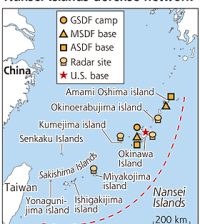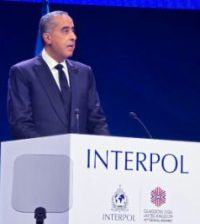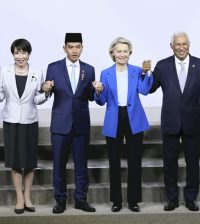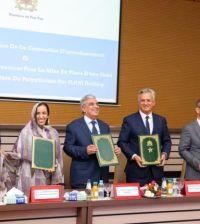- Washington “follows with interest” Morocco’s openness onto Africa (John Kerry)Posted 12 years ago
- The trial of South African Paralympic champion Oscar Pistorius opened in Pretoria on Monday.Posted 12 years ago
- USA welcomes efforts of King Mohammed VI in MaliPosted 12 years ago
- Egypt’s population reaches 94 millionPosted 12 years ago
- Mugabe celebrates his 90thPosted 12 years ago
- Moroccan Monarch to Build a Perinatal Clinic in BamakoPosted 12 years ago
- King Mohammed VI handed a donation of bovine semen for the benefit of Malian breeders.Posted 12 years ago
- Moroccan King’s strategic tour to Africa: Strengthening the will of pan African Solidarity and stimulating the south-south cooperation mechanisms over the continentPosted 13 years ago
- Senior al-Qaida leader killed in AlgeriaPosted 13 years ago
- Libya: The trial of former Prime Minister al-Baghdadi AliPosted 13 years ago
UN Speech King Mohammed VI denounces North South gap
In an outstanding speech delivered on his behalf by Prime Minister Abdelilah Benkirane, King Mohammed VI made an impassioned plea for Africa and denounced the long-term consequences of colonialism in the continent, which has expanded the gap between the north & the South.
King Mohammed’s speech at the UN General Assembly opened with a statement that sustainable development depends upon economic, social, environmental, security, and political considerations. These are complex, and each country must move at its own pace.
Most importantly, the King asserted that poorer countries have the right to be treated with respect by the richer countries and should be permitted to achieve what is possible for them with aid from the developing world. It has been a long time since a world leader spoke up for the countries of the Global South, particularly Africa.
His speech provided an important counterbalance to the pressures of the Western governments, many of which appear to have forgotten that they were colonial powers that instigated many of the problems that countries in the developing world have been experiencing for years, such as the lack of a proper industrial system.
Developing countries were used in the colonial period as suppliers of raw materials and cash crops such as coffee, which benefited the colonial powers at the expense of the Global South.
King Mohammed pointed to Morocco’s pioneering efforts at developing human resources as well as renewable energy, including solar and wind power, which are key elements in sustainable development since they allow a country to avoid the use of fossil fuels in creating energy. With Africa in mind, he called on developed countries to treat developing countries, especially in Africa, fairly with regard to development issues.
The Moroccan monarch called for respect for individual countries and their cultures and those are still suffering the long-term consequences of colonialism. In this regard, he pointed to the disorientation and disruption of cultures caused by colonialism, adding that that former colonial powers have no right to ask developing countries to introduce rapid changes in an unfamiliar context.
He said that the developed countries should be more aware and realistic when dealing with the developing countries, calling for greater support. Development cannot be achieved without stability, he asserted. Developed countries unfairly rate countries of the Global South, and aid is based on these ratings. He called for intangible capital to be used in assessing countries’ needs.
King Mohamed VI pointed to Morocco’s pioneering work on fertilizer production in Africa. He reminded the UN General Assembly that in his address in Abidjan last February, he insisted on the fact that Africa does not need humanitarian aid as much as it needs mutually beneficial partnerships. He also stressed that Africa had to turn the page on past conflicts and begin to resolve the challenges it faces. Africa has to overcome deep-rooted economic dependence on other countries, a lack of support and funding, and the absence of a sustainable development model. The King’s speech insisted on the long-term damage caused by exploitive colonial policies. The provision of aid to developing countries is a duty, and African countries should respond by ensuring good governance, he said.
The choice is between more aid and increased conflict, which are the result of more violence and terrorism, which feed on injustice and exclusion. He concluded by calling for a global awakening regarding the need to work for a more secure, more equitable and more humane world.




